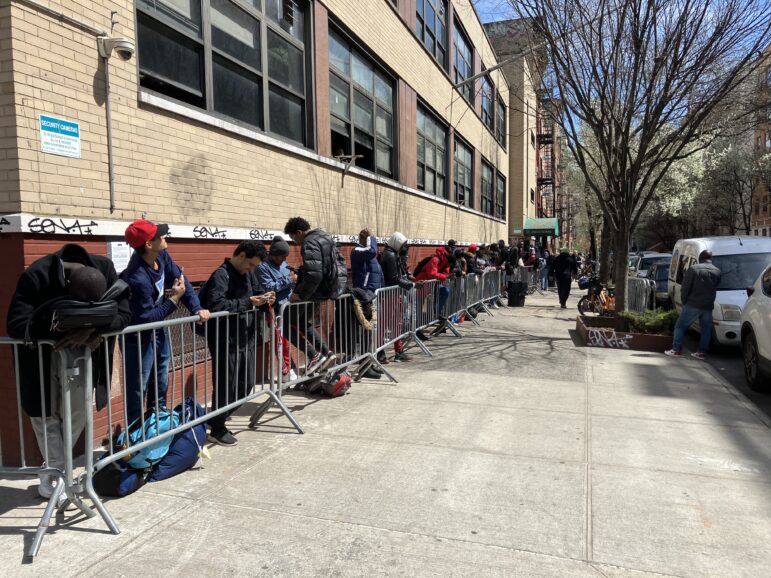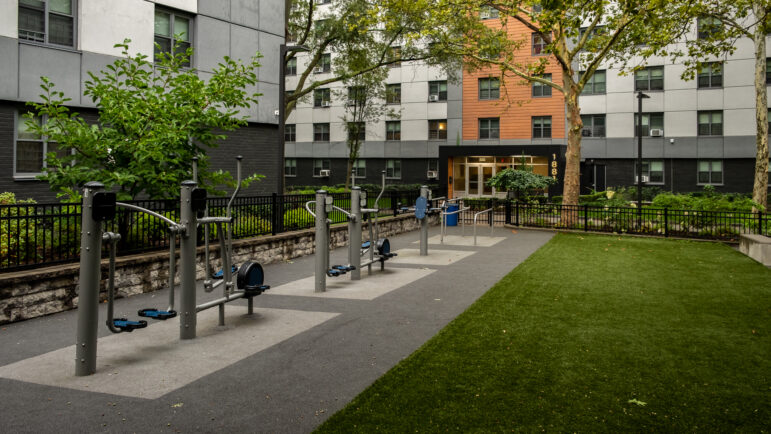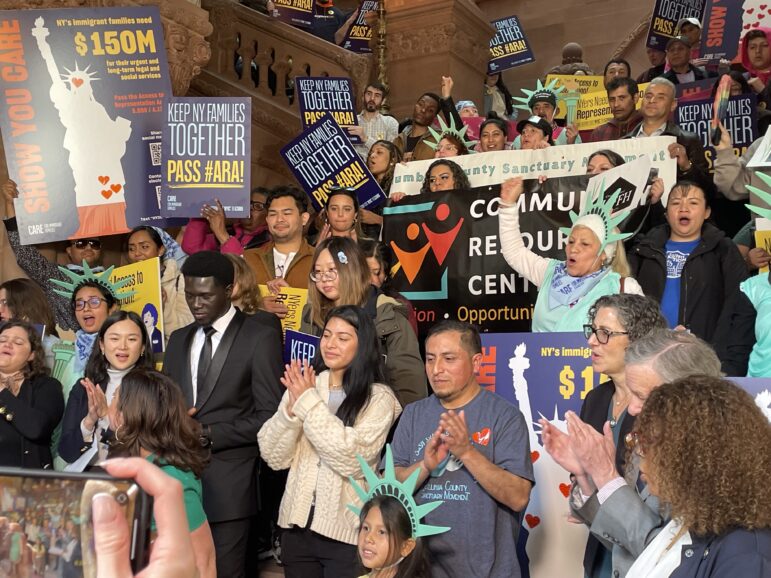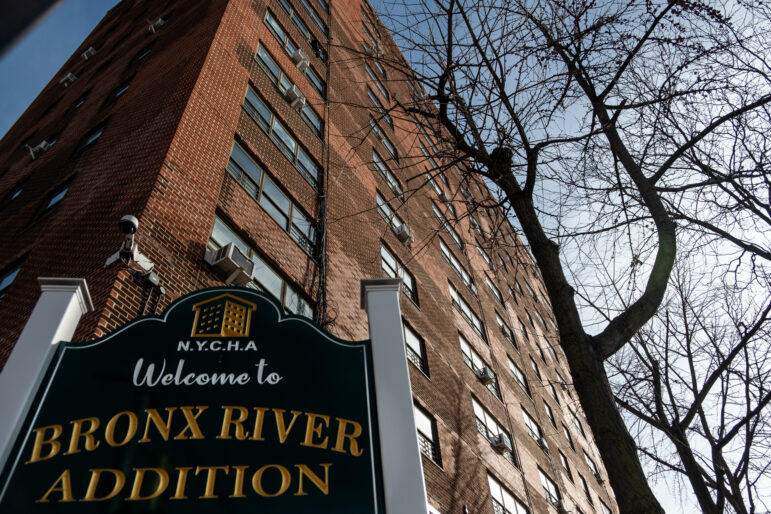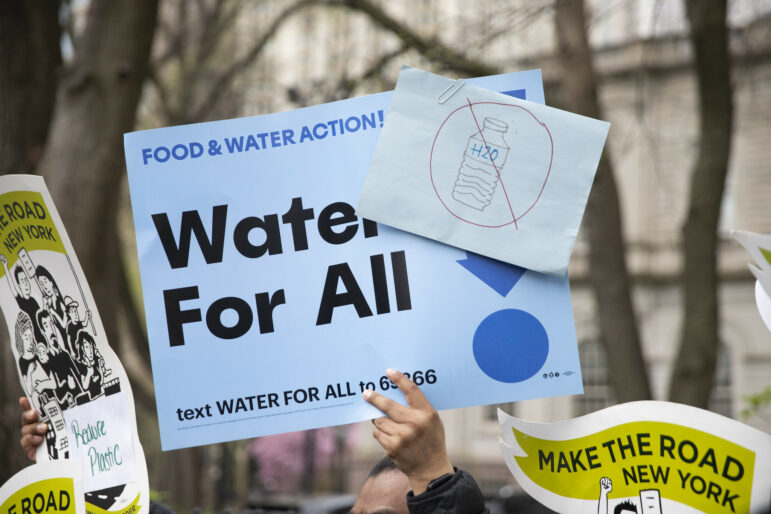
Photo by: White House
Polls show President Obama’s plan to raise the minimum wage has broad support. But there is debate over what impact it will have on poverty and income inequality.
Melissa Jordan, 24, says she “loves” proposals by President Obama and elected officials in Albany to raise the minimum wage to $9 an hour, from its current rate of $7.25.
Jordan has been working two years as a cashier at a pizza chain in Bedford-Stuyvesant. She hasn’t seen a raise since she started working there full-time two years ago. Today, she works 24 hours a week.
Even when she was a full-time employee earning the minimum, she says couldn’t have supported her two small children without her husband’s salary. She gets no insurance from her employer.
The president’s plan to bump up the minimum wage and tie it to annual increases in the cost of living would allow her more free time to spend with her children, she says.
But it wouldn’t do anything to help the manager of a fast-food outlet nearby
who earns almost twice the federal minimum wage yet still barely makes it. By the time she is finished paying her bills at the end of each month, the single mother of three, who asked not to be named, is left with just about “nothing.”
She works 54 hours a week. Her monthly rent of $1,000 dollars for a one-bedroom apartment swallows half her monthly take-home pay. Since her employer doesn’t provide health benefits, she must pay her own. Daycare for one child adds to her onerous expenses. The only help from the government she receives, she says, is a small amount in food stamps.
A few blocks away a parent of two young children is also asking for more while he hands out leaflets for tax season. He works eight hours a day, six days a week, which adds up to $250 after taxes have been taken out, not including a paltry sum in commission. He suspects his employer isn’t paying him his fair share but he says he can’t say much for fear of dismissal.
He lives among the one in five households in Brooklyn who report an annual income of less than $15,000 and who could use a raise. But among many small-business owners in the city, federal and statewide plans to raise the minimum wage are getting a more lukewarm reception. And even those who support a higher minimum wonder how much good it will do in places like Bedford-Stuyvesant.
Millions earn the minimum
Opinion polls nationwide show strong support for the wage-hike proposal which, if passed, will take effect on January 1, 2014 and will automatically increase the minimum wage each year by indexing it to inflation.
A recent USA TODAY/Pew Research Center poll found that 71 percent of Americans supported Obama’s call in last month’s state of the union address for a hike.
The New York minimum wage is automatically replaced with the Federal minimum wage rate if it is higher than the state minimum. New York is one of “ target=”_blank”>21 states with a minimum wage equal to the federal one; nineteen have wages set higher than the national minimum. Five states have no minimum wage and four states have set a minimum wage that would be lower than the feds’.
In his January state of the state address, Gov. Andrew Cuomo called for raising the state minimum to $8.75 an hour. A Quinnipiac Poll from January 31 showed overwhelming local support for that measure. 95 percent of Democrats and 61 percent of Republican voters in New York State favored the move. Since then, the Democrat-controlled state Assembly has passed a $9 minimum wage, indexed to inflation.
Yet even with broad public support, the proposal remains a wedge issue. The wage-raise legislation that passed the state Assembly last week remains stalled in the Republican-controlled Senate, stymied by conservative claims that it will cost jobs and impose undue hardships on small businesses.
While those on the left say the legislation will stimulate the economy, some have broken ranks, describing the hike as inadequate to reduce income inequality, which has been growing since the mid-1970s. They say it will do little to lift families out of poverty. Almost one in four Brooklyn residents live in poverty.
The number of workers earning the minimum wage in New York has been growing in recent years. In 2012, 113,000 people were being paid the minimum wage, up more than 20,000 on the previous year, according to Bureau of Labor Statistics (BLS). About 3 percent of the 4.1 million hourly-wage workers in New York are making the minimum wage.
Nationally the proportion of hourly paid workers earning the prevailing federal minimum wage or less declined from 5.2 percent in 2011 to 4.7 percent in 2012. This remains well below the figure of 13.4 percent in 1979, when data were first collected on a regular basis according to the BLS. Nationwide, the 3.6 million workers with wages at or below the federal minimum made up 4.7 percent of all hourly paid workers, according to the federal Department of Labor.
However, according to David Cooper, an analyst with the Economic Policy Institute in Washington, that figure doesn’t describe the true national picture, because many states have a minimum wage higher than the federal floor. A national hike, he says, will give a raise to at least 18 million workers. But the proposal has some business groups fuming.
Business fears
The Business Council of New York State, Inc. (BCNYS), which represents large and small firms, strongly opposes the wage-hike legislation.
A full-time employee on minimum wage annually earns $15,000 and change, according to the BCNYS. It estimates that a hike to $9 an hour will eat away at company profits. After factoring in for social security and workers compensation, the new minimum wage will cost each business somewhere in the region of $22,189 each year, increasing labor costs by close to 25 percent. The Council cites a 2008 study by Cornell/American University, which it says found that raising the minimum wage from $7.15 to $8.25 would result in the loss of 28,990 jobs including 7,031 poor workers in New York alone.
Jack Mozloom, a spokesperson for the National Federation of Independent Businesses (NFIB), a network of small business owners in New York, says the government shouldn’t even be in the debate at all. Mozloom couldn’t disagree more with the claim that many minimum wage workers are breadwinners who depend on it to raise a family.
“They want us to believe that everyone out there on minimum wage is a single parent escaping poverty,” which is nonsense he says. If anything he says a hike will harm rather than help the working poor since it will lead to fewer jobs.
An increase will only make the market more competitive, he says. It will
make minimum-wage jobs more attractive to experienced workers looking for better-paying employment. The low-skilled and college-bound kids who typically take those jobs will consequently face stiff opposition from higher-skilled applicants.
He says that while downstate can afford a raise due to its concentration of large corporations like financial firms, upstate New York—where the economy is largely dependent on small businesses like motels and diners—can’t. He says he foresees the loss of up to 22,000 jobs if the legislation passes.
The case for a hike.
Contrary to GOP claims, large corporations hire the majority of low-wage workers, not small businesses, Cooper says.
Behind the rhetoric of Republican support for mom-and-pop stores are private-interest groups working on behalf of large corporations like fast-food outlets, says Jack Temple, an analyst with the National Law Empowerment Project. Each time the minimum wage issue enters the political arena a flood of money from big business starts pouring in.
He says that that a raise will, in fact, stimulate economic output. Since data shows that low-wage workers tend to spend more of their wages than higher earners it will have a multiplier effect. However, he concedes the adjustment will be “modest”, adding an estimated $11 billion to the nation’s $15 trillion economy annually. He adds that had the federal minimum wage been indexed to inflation in recent decades it would be in today’s dollars worth over $10 an hour.
Temple points to a recent study from the Center on Economic and Policy Research which he says concludes that “the weight of the evidence points to little or no employment response to modest increases in the minimum wage.”
Other studies see the minimum wage issue as a public-health problem.
One 2009 research paper from the National Bureau of Economic Research found that gradual reductions over time in inflation-adjusted minimum wages across states explain about 10 percent of the increases in average body mass since 1970. Scores of studies in economics and epidemiology link low income to health problems including diabetes, heart disease, arthritis, and premature mortality, according to the EPI website.
Opinion in Brooklyn
Despite concerns about the impact the proposal may have on business, the Brooklyn Chamber of Commerce, a network of borough businesses recently hailed Cuomo’s call for a hike to $8.75 an hour, indexed to inflation. In a statement it says the move would go a long way toward putting more money in the pockets of New Yorkers while also stimulating the economy.
But Antonio Rodriquez, who runs a dry cleaners on Myrtle Avenue, overlooking Forte Greene Park, disagrees. He’s proof that not everyone who employs minimum-wage workers owns a large corporation.
Whatever the polls say, he opposes the legislation. Business in the current economic climate is not good ,he says. Claims by state and Congressional Democrats that a hike can easily be passed onto the customer don’t add up to him. He says it will more than likely mean fewer customers, not more.
To Jumaane Williams, who represents Bushwick, Flatlands and East Flatlands in the City Council, some of the poorest neighborhoods in the borough, the hike is “bottom of the barrel.” He is calling for a “real conversation” on the minimum wage. Echoing Temple, he says legislators need to push for a higher minimum. Customers, he adds, wouldn’t mind paying ten cents more for a Big Mac.
Questions about impact
According to Anna Musatti, a professor of economics at Columbia University, raising the minimum wage could substantially reduce the ranks of the working poor. She estimates that currently, a single mother of two working full time at the federal minimum wage has annual earnings of $14,500, about $4,500 below the poverty line for a family of three. Increasing the minimum wage to $9 would almost entirely close this poverty gap (although it could also affect the level of earned income tax credits that the mother receives).
How a raise in the minimum wage will affect the yawning gap between the rich and poor is also the subject of much debate.
According to the EPI, between 1973 and 2011, the median worker’s real hourly compensation (which includes wages and benefits) rose just 10.7 percent. Most of this growth occurred in the late 1990s wage boom, and once the boom subsided by 2002 and 2003, real wages and compensation stagnated for most workers, with the exception of those close to or at the top. This has made the last decade a “lost decade” for wage growth the EPI report concludes. Lucrative compensation packages for corporate CEOs have played a key role in explaining the widening wage gap.
Because low-wage occupations in the retail and restaurant sectors continue to dominate job growth in the post-recession recovery, raising the minimum wage remains a critical step toward improving job quality and reducing economic inequality, Temple says.
But one can’t expect the higher minimum wage to significantly alter income distribution, Musatti says. “The recent increases in income inequality were driven by higher income dispersion at the top of the distribution. The issue here is the top 0.1 percent now earning hundreds times what the rest of the top 1 percent earns. A higher minimum wage will not affect that.”


